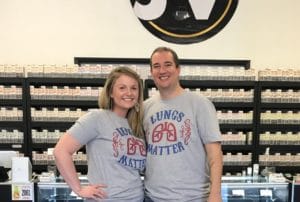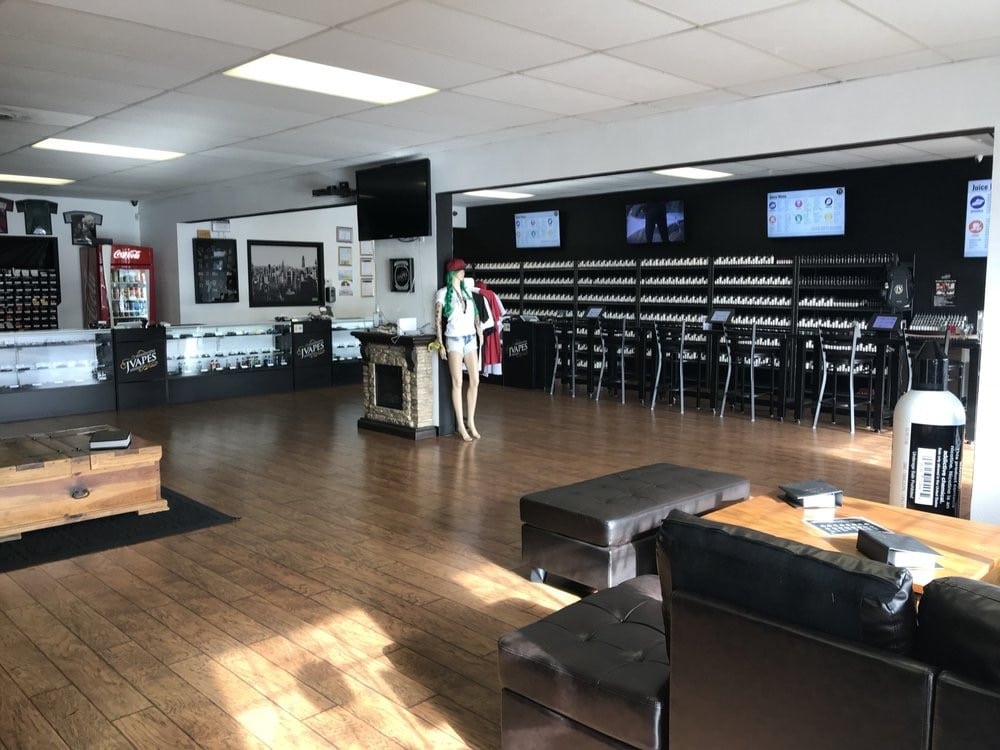People who rely on vapes and other reduced-risk nicotine products—overwhelmingly former smokers, or those in the process of switching—face immediate worries over access during the coronavirus lockdown, as well as long-term fears for the survival of the small shops on which many rely.
Amanda Wheeler, the owner of Jvapes, which has locations in Colorado, Oklahoma and Arizona, said she had to lay off employees at two shops in Colorado. “I’ve never had to close a store before,” she told Filter. “It felt like a sad preview of what is to come.”
Living in Colorado, I’ve found for myself how Wheeler’s staff are welcoming, kind and full of knowledge about the various intricacies of using a mod system or selecting a flavored e-liquid. They offer the kind of personalized guidance that can make all the difference for people trying to quit cigarettes.
Colorado Governor Jared Polis (D) declared a pandemic-related state of emergency on March 10. Like most of the country, Colorado established guidelines for social distancing, as well as what qualifies as an “essential” business.
Cigarettes remain widely available in businesses deemed essential.
A national and international debate revolves around whether specialty vape shops are essential. In Colorado, as in numerous other US jurisdictions, they were deemed non-essential, and are required to temporarily close all in-person operations.
It should be noted that cigarettes remain widely available in businesses deemed essential, such as gas stations and convenience stores. Liquor stores and marijuana dispensaries are also deemed essential and remain open.
It is true that some vaping products can also still be purchased at convenience stores. But since the Food and Drug Administration has effectively banned sales of flavored cartridges, the many vapers who prefer flavors can only find unflavored pod devices or single-use devices at these locations. For many people, these options don’t fit their needs.
Vape stores and vapers have been advocating against this situation. “We are hopeful that Governor Polis might make some kind of allowances to enable us to offer curbside [pick-ups], but the likelihood of that is very low,” Wheeler said.
Online vape sales are also permitted, but that still leaves many vapers at a disadvantage. Significant numbers of people, particularly the most marginalized, lack internet access. Older people, for example, may not be comfortable ordering online. And people who are relatively new to vaping will miss out on the personalized guidance and encouragement exemplified by Wheeler’s staff. It is easy to imagine some people returning to smoking in these circumstances.
Being restricted to online sales—with a shortfall in overall business and facing competition from larger online vendors—also harms the small shops on which customers would hope to rely long-term. Wheeler told Filter that her business’s total sales have declined 30 percent since the lockdown.
“Despite going through chemo and radiation, I still smoked for 10 years after that. I couldn’t quit any other way than vaping.”
Wheeler has a background in clinical addiction counseling, and entered the vaping industry with her husband just over five years ago. She was previously, at the age of 19, diagnosed with Hodgkin’s lymphoma, but stayed a consistent smoker for a decade.
“The vaping industry has impacted every part of my life, very personally,” she said. “Despite going through chemo and radiation, I still smoked for 10 years after that. I literally couldn’t quit any other way than vaping. My husband was a two-pack-a-day smoker and he quit with vaping. Everything about vaping made our lives better. That’s why we have a business selling these products to others.”

I asked her how she sees the future of her business and the wider vaping industry. “I wish I had the crystal ball that contained the answer to that question, ” she replied. “Our challenges are myriad and exist at every level of government.”
Part of the problem may be that vaping, as a relatively new innovation, doesn’t yet enjoy the same level of mobilization, in terms of activism and lobbying, as more established forms of drug use.
Marijuana advocates like the National Organization for the Reform of Marijuana Laws (NORML) have rightfully and responsibly recommended that governors of states with legal medicinal marijuana should classify dispensaries as essential for patients. Adult-use dispensaries have also been included in numerous jurisdictions, including Colorado for curbside pick-up.
In the case of alcohol, Denver Mayor Michael B. Hancock implemented a citywide ban on non-essential business—and he included liquor stores, a move with the potential to jeopardize the health of dependent drinkers. Hearing of this plan, people swamped the city’s liquor stores hours before the closures took effect, buying up remaining stock. Under pressure from the public as well as lobbying from the city’s liquor retail industry, Mayor Hancock then relented, expanding the definition of essential businesses to include liquor stores.
Wheeler feels these differences keenly. “We feel that we are more essential than liquor or recreational cannabis, as people depend on our products to stay off of combustible tobacco,” she said. “It is particularly poignant that cigarettes remain freely available, and yet open vapor products are not as accessible.”
“Vapers deprived of their vaping products are at risk of restarting smoking to cope with heightened levels of stress and anxiety,” Dr. Riccardo Polosa*, a researcher on vaping and tobacco harm reduction, said in an email discussing the essential status of vaping in his home country of Italy. “They have the right of a less harmful alternative to cigarettes. There is no doubt to my mind that vape shops, being ‘essential health facilities,’ should stay open.”
Filter recently profiled Polosa following his successful efforts to convince the Italian government to deem vape shops as essential. He also noted that “Vape shops have quickly adopted government recommendations about complying with social distancing.” Wheeler mentioned that her stores in Oklahoma and Arizona are doing the same, for example by strictly limiting the number of people allowed inside at a time.
“A tragic blow to harm reduction.”
Situations similar to that in Colorado are unfolding around the US. Danish Iqbal, the CEO of e-cigarette wholesaler Medusa Distribution and the president of the New Jersey Vapor Rights Coalition, also has a fight on his hands.
“Most states that have stay-at-home orders have deemed vape shops to be “non-essential” businesses,” Iqbal wrote in an email to Filter. “Nicotine vaping is, by the admission of the FDA, a safer alternative to combustible tobacco cigarettes.”
“While convenience stores and gas stations are still selling those, millions of people who switched to vaping now have no access to products,” he continued. “It is essential to keep people who switched from cigarettes off of them.”
Like Iqbal, Wheeler—who is also vice president of the Rocky Mountain Smoke-Free Alliance and executive director of the Arizona Smoke-Free Business Alliance—emphasized the harms already done to the industry by recent events, and the knock-on impact on vapers.
“We are at a David and Goliath moment, ” she said, “except we are fighting at least three Goliaths at once. We have several states now that have completely fallen for the vape industry, which is really a tragic blow to harm reduction. We must find a way to overcome the rampant misinformation about vaping, and rapidly become as politically savvy as our more well-funded opponents.”
* Dr. Polosa’s Center of Excellence for the Acceleration of Harm Reduction has received grants from the Foundation for a Smoke-Free World (FSFW). Michael McGrady is a recipient of Tobacco Harm Reduction Scholarship from Knowledge-Action-Change (KAC), independently administered by KAC and supported by a grant from FSFW. The Influence Foundation, which operates Filter, has received restricted and unrestricted grants, respectively, from KAC and FSFW. Filter’s Editorial Independence Policy applies.
Photographs of empty store, and of Amanda Wheeler and her husband, courtesy of Wheeler.





Show Comments